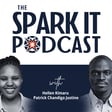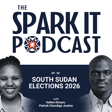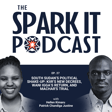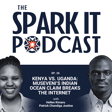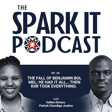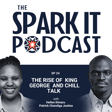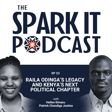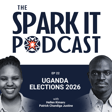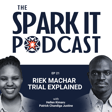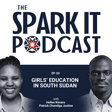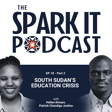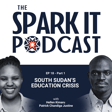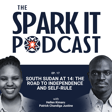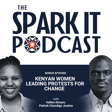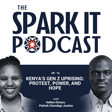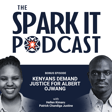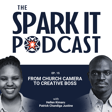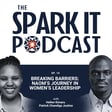Become a Creator today!Start creating today - Share your story with the world!
Start for free
00:00:00
00:00:01

Starting Over After War
In this episode of The Spark It Podcast, Hellen Kimaru and Patrick Chandiga Justine sit down with Emmanuel Taban, a political commentator and a final-year governance student at Yukon University, Canada. He shares how war forced him to leave his home in South Sudan. He talks about escaping to Uganda, starting life from zero in a refugee camp, and how education and hope helped him rebuild. His story is about courage, learning, and believing in yourself no matter what. A great listen for anyone interested in refugee stories, youth leadership, resilience, and rising through tough times.
Transcript
Introduction to Emmanuel Turban
00:00:01
Kimaru
Welcome to the Sparkhead podcast with Miki Maru and my co-host Patrick CJ and today we are honored to host a very very great guest the name is Emmanuel Turban. Emmanuel is ah finally a final year student at Tewcon University pursuing a bachelor's in arts in indigenous governance.
00:00:24
Kimaru
He's a political commentator a South Sudan national and a resilient human. And in
Emmanuel's Early Life and Education
00:00:30
Kimaru
this episode, we will be talking about his early life, his experiences with displacement caused by the war in South Sudan, him resettling in Uganda and the power of education and his vision for the future.
00:00:44
Kimaru
Emmanuel, we are excited to have you and on Spark It podcast. Maybe you can say hello before we get started.
00:00:53
Emmanuel Taban
Hello, Kimaru and Patrick and hello viewers. Thank you so much for having me.
00:00:59
Kimaru
Yeah, we're excited to have you here. Thank you so much for honoring this invite. Yes,
Interest in Political Commentary
00:01:04
Kimaru
I was checking through, as a political commentator, I was checking through your social media and you say that because politics determines every aspect of our lives, it's like your slogan.
00:01:16
Kimaru
And I do believe in that, particularly because ah used to think that politics doesn't necessarily affect who we are, but it definitely affects every aspect of our lives.
00:01:27
Kimaru
Anyway, we will definitely probably talk a little about that in this podcast. But ah before we even get to that, maybe you can tell us a little bit about your life before the war started in South Sudan.
00:01:42
Emmanuel Taban
Oh,
Life and Education in South Sudan
00:01:43
Emmanuel Taban
great. oh Yeah, as you said, I'm a South Sudanese national, originally from South Sudan. That's how I identify.
00:01:50
Kimaru
Mm-hmm. Mm-hmm. Mm-hmm.
00:01:53
Emmanuel Taban
And... um I lived in South Sudan almost the entire of my life. ah But I think the moment that I really can recall where I feel I was existing was in 2005. And in 2005, that's when I started my early school life, that's in primary.
00:02:14
Emmanuel Taban
And there is a town and now ah that's bordering Uganda called Ye. I think that's where I and Patrick live there.
00:02:25
Emmanuel Taban
So Ye a very, very, really and trust interesting town, very cosmopolitan.
00:02:25
Kimaru
Mm-hmm. Mm-hmm.
00:02:25
Patrick Abure
Yeah.
00:02:30
Emmanuel Taban
it like it It almost brings in every ah person from all the parts of the country and a very great place.
00:02:39
Kimaru
home
00:02:39
Emmanuel Taban
um That's where I lived ah most entire ah for the whole of my life.
00:02:42
Kimaru
but
00:02:44
Emmanuel Taban
like over I would say over 18 years, that's where that's that that's where I lived before. And then I lived with my my mom most of the time. I never had a chance to live with my dad.
00:02:56
Kimaru
Oh wow.
00:02:56
Emmanuel Taban
And I grew up with my uncle. And he just like I feel like he he he played every single role just like a dad would do. and And I'm really, really very ah happy that I had that privilege to live with my uncle.
00:03:13
Kimaru
but hu
00:03:13
Emmanuel Taban
And um in 2005, that was when I started my primary. And yeah very exciting that also i and Patrick went to the same primary school. ah
00:03:23
Kimaru
ah wow
00:03:24
Emmanuel Taban
Yeah.
00:03:24
Patrick Abure
Yeah.
00:03:25
Kimaru
That's interesting.
00:03:26
Emmanuel Taban
The school is called Jigomoni Primary School.
00:03:27
Kimaru
Okay.
00:03:29
Emmanuel Taban
And it's a government school, by the way. And ah that's where I started ah from 2005.
00:03:32
Kimaru
who
00:03:34
Emmanuel Taban
in 2005, and in two thousand and um In 2011, I completed my primary. and did my primary living examination. And by that time, I think we were doing, still, we're learning the Ugandan curriculum.
00:03:49
Emmanuel Taban
So, and
00:03:49
Kimaru
okay
Transition to Uganda and Secondary Education
00:03:50
Emmanuel Taban
and and that was my that was the last year where ah students from South Sudan were doing the Ugandan curriculum in 2011.
00:03:56
Kimaru
Mm-hmm. Mm-hmm. Mm-hmm.
00:03:57
Emmanuel Taban
So when done with my primary, The following year, I enrolled for my secondary ah level. That was in Excel.
00:04:08
Emmanuel Taban
So Excel is... um Like, it's a it has so many branches. There was one ah branch in a place called... Morobo, there's one within Yei, where we used to live. And there's one also in, there was one in Mukaya.
00:04:21
Emmanuel Taban
So Mukaya, it's like my my home village.
00:04:22
Kimaru
through
00:04:25
Emmanuel Taban
That's where my parents come from, my dad and mom, they would come from Mukaya. So there was a, XL had like a boarding branch in Mukaya. So that's where I went for my secondary school.
00:04:36
Emmanuel Taban
i started there.
00:04:38
Kimaru
Mm-hmm.
00:04:38
Emmanuel Taban
and
00:04:38
Kimaru
Mm-hmm. Mm-hmm.
00:04:39
Emmanuel Taban
in two thousand And in 2016, I completed my secondary school And just like months after completion, I enrolled for, because I had, when I was in in secondary school, I really fell in love with journalism.
00:04:51
Patrick Abure
Thank
00:04:57
Emmanuel Taban
I do a lot of writing. like we I became a member of the journalism club in school. We write a lot of stories in school and present them during assembly. And I really became so much passionate about journalism.
00:05:10
Emmanuel Taban
And I felt like that that was the first thing that came to my mind. I was like, when I get done with secondary school, like I would want to go and do journalism.
00:05:16
Kimaru
Yeah. Mm-hmm. Mm-hmm.
00:05:18
Emmanuel Taban
That was number one priority in my mind. So after completion of my secondary school in 2016, just like after a month, and and I enrolled for a journalism course, journalism and radio presentation program.
00:05:35
Emmanuel Taban
And that was in 2016. But even when I started my my my secondary school in 2012, just like the next year in 2013, that's when ah the war started in South Sudan on December 15, 2013.
00:05:48
Kimaru
Mm-hmm.
00:05:51
Emmanuel Taban
But it was only ah it was based mainly in the capital, Juba.
00:05:51
Kimaru
Mm-hmm.
00:05:56
Emmanuel Taban
So it didn't escalate like to most parts of the country in 2013.
00:05:59
Kimaru
Okay.
00:06:00
Emmanuel Taban
So from 2013, 14, 15 and 16, I had the privilege to complete my secondary school.
00:06:00
Kimaru
Mm-hmm. Mm-hmm.
Fleeing to Uganda and New Beginnings
00:06:07
Kimaru
so
00:06:07
Emmanuel Taban
But then in 2016, after my secondary and when i enrolled for the journalism training, that's when now the fight escalated to different parts of of the country and where I was living, me and Patrick where were living, also became so much insecure.
00:06:18
Kimaru
Yeah.
00:06:24
Emmanuel Taban
And um I remember like when I was about to ah get into my exams for ah the journalism and radio presentation but ah training, oh it was, I think like we just left with like a week to exams and then the whole thing started in EA.
00:06:35
Kimaru
yeah
00:06:42
Patrick Abure
Mm-hmm.
00:06:42
Kimaru
hello
00:06:42
Emmanuel Taban
So ah there were a lot of chaos, like targeted killings, people were killed at night and so many stuff. So it really became so much insecure. Like when most of the the kids were asked to stay at home.
00:06:57
Emmanuel Taban
So schools were closed for that reason. And then ah I couldn't have the time like the to complete my training that I enrolled for. So in 2016,
00:07:08
Kimaru
Yeah.
00:07:10
Emmanuel Taban
ah when my uncle and the family, when they saw that things were not going right and it's not long enough for us to be there,
00:07:21
Emmanuel Taban
um they decided that we leave the country for Uganda. And I remember the moment that actually sparked that move that my uncle became so much just scared was that I remember this day when there was this great business guy who was in EA and that guy, ah there was one evening that some kind of chaos started in the town and then that guy was so dead.
00:07:37
Kimaru
Mm-hmm. Mm-hmm.
00:07:47
Emmanuel Taban
So I think that incident really, ah
00:07:49
Patrick Abure
I think I know the guy.
00:07:51
Emmanuel Taban
Yeah, like that incident, that's the one, that's the guy.
00:07:52
Patrick Abure
Is that Romano?
00:07:55
Patrick Abure
Yeah, yeah, yeah. He was close to our studio.
00:07:55
Emmanuel Taban
So that incident,
00:07:59
Emmanuel Taban
yeah, right.
00:08:00
Patrick Abure
And the day he was shot, we were actually there.
00:08:03
Emmanuel Taban
Right, yeah. So that day, my my my uncle's son was in town, and when that incident happened, he ran right away from town home, and he couldn't even stop on the compound, just rushed inside his room.
00:08:09
Kimaru
Mm-hmm. Mm-hmm. Mm-hmm.
00:08:17
Emmanuel Taban
So we knew things were not right, and people were worried at home, and uncle told us that now it's not safe for us to live there, so we had to live. But even when were living for Uganda, we didn't know we were going to spend so much time because we were just told, ah let's just go and stay there maybe for two or three weeks or a month, and then
00:08:31
Kimaru
but
00:08:37
Kimaru
shot
00:08:38
Emmanuel Taban
Today we'll come back. So um that evening, I remember we started packing our things and and we we couldn't even go with so much. we just went with a little of our belongings, like little clothing and some foodstuff.
00:08:52
Emmanuel Taban
And then I saw a vehicle the following morning, came home there and yeah, they they told us, you're leaving for Uganda. I was kind of hesitant at at the start because I really didn't want to go to Uganda because I just completed my secondary school and I was enrolling for my journalism.
00:09:02
Kimaru
yeah yeah
00:09:07
Kimaru
yeah
00:09:11
Emmanuel Taban
I feel like I was on the right way, on the right track, really. So I didn't want really to leave the country, but My uncle said there's no way we're going to stay there. So we had to leave. So we left Yei and then we traveled.
00:09:22
Kimaru
her
00:09:30
Emmanuel Taban
And that day, I think it took us like almost like five hours or six like that. I can't remember exactly.
00:09:35
Kimaru
Yeah.
00:09:37
Emmanuel Taban
And then most interesting thing, when we reach the border,
00:09:37
Kimaru
Mm-hmm.
00:09:41
Emmanuel Taban
um but I mean, the border, Uganda and South Sudan, like in Kaya, that's when i noticed that a lot of people were leaving the country. Like when we reached the border, I think that the whole of Yei, the town where i was living, was just there.
00:09:51
Kimaru
Mm-hmm.
00:09:54
Kimaru
yeah
00:10:00
Emmanuel Taban
So many people, so many people.
00:10:03
Kimaru
but
00:10:03
Emmanuel Taban
So that's that's literally how I lived my life, my early life, and how I escaped the Yei for Uganda. Yeah.
00:10:14
Kimaru
Oh, wow. That's... Oh, wow. Honestly, I don't even know what to say. can only imagine um sort of like how it must have felt to, you know, know that you are stable, you are living somewhere, everything is working out all right, and then something just happens and sort of it changes the trajectory of your life, and now you have to sort of start over. How did it maybe feel for you sort of leave these dreams behind Like the fact that you were already enrolled in a school, you're doing journalism, you're pursuing something you're passionate about, and now it's like you don't know what to expect. You're moving to another country, and everything sort of has been destabilized. How did sort of that feel for you at that point?
00:11:02
Emmanuel Taban
i It really felt so scary because one, and and one funny thing, by the way, that I always tell ah people and they don't believe it sometimes is that i I never stepped out of South Sudan since I was born until 2016.
00:11:17
Kimaru
Okay.
00:11:18
Emmanuel Taban
in I never left the country.
00:11:18
Kimaru
Okay.
00:11:20
Emmanuel Taban
So right from when I
00:11:20
Kimaru
Okay.
Life in Refugee Camps
00:11:22
Emmanuel Taban
was born until 2016, I lived my entire life in South Sudan.
00:11:26
Emmanuel Taban
And also, I only visited the capital city like twice. And I even never had a chance to live there like for more than a month. So my entire life, I grew in Ye. And, you know, like when you stay in a place for a very long time, that that means really a lot for you. You have a lot of, I mean, so much attachment to that place.
00:11:46
Emmanuel Taban
That's where you have your childhood friends.
00:11:47
Kimaru
Mm-hmm. Mm-hmm. Mm-hmm.
00:11:49
Emmanuel Taban
That's where you started your life. You started your school. And just living such a place, like, really means so much. And I felt like when I was living Ye for Uganda, I felt like I've just left all that I had behind.
00:12:04
Emmanuel Taban
You know, like all the friends, the people I knew, the memories, everything I felt like they were just left behind. It was scary at at first. and But i i like I used to hear stories about how our parents used to live in the refugee camp.
00:12:21
Emmanuel Taban
And I couldn't imagine the life that they were going through.
00:12:22
Kimaru
Here we go.
00:12:24
Emmanuel Taban
And I never expected that maybe at some point I was also going to live in the refugee camp.
00:12:28
Kimaru
back
00:12:29
Emmanuel Taban
But when that time came and we had that chance to go and stay in the refugee camp, that's when now I really get to know what life in the refugee camp really feels. Yeah. But that moment living here for Uganda, it was and was just, it was scary and so emotional moment for me.
00:12:47
Emmanuel Taban
Yeah.
00:12:49
Kimaru
did you Did you guys like have trouble at the border? Because I believe like maybe sometimes when there's a war happening in a neighboring country and people are trying to flee to the next country, maybe there's sort of issues.
00:12:53
Emmanuel Taban
and
00:13:00
Kimaru
Did you experience anything or it was just like a free pass to enter Uganda and they accommodate you in these circumstances?
00:13:06
Emmanuel Taban
oh i I think so many people, i had stories from people who really experienced so much trouble when they were leaving the country, but I i believe like maybe that's because like when when we're living when we are leaving, I believe in God.
00:13:14
Kimaru
Mm-hmm.
00:13:21
Emmanuel Taban
like We're all Christian and We had really a very strong prayer that day when we were leaving and we just surrendered our lives to God. we we We knew like it wasn't that safe for us to go from from South Sudan to Uganda, but um we just asked for God's protection and we
00:13:35
Kimaru
Yeah.
00:13:41
Emmanuel Taban
I think maybe because of that prayer, there was really nothing that happened along the way. we All we could see, like we saw ah soldiers along the way, like people holding guns and like there's a town along the way, like another county called Morabu. Like we just find vehicles like barn and just a smoke going in that town. And it was really a very scary moment, but we successfully reached Uganda without facing any trouble along the way.
00:14:09
Emmanuel Taban
Yeah. But there are so many stories from other people that were really so bad when they were leaving the country.
00:14:14
Kimaru
Mm-hmm.
00:14:14
Emmanuel Taban
They really experienced very, very, very bad moments. Yeah.
00:14:18
Kimaru
Okay.
00:14:19
Emmanuel Taban
All right.
00:14:19
Kimaru
All right.
00:14:21
Patrick Abure
um
00:14:24
Patrick Abure
it's it's ah it was a very scary thing leaving.
00:14:29
Kimaru
Mm-hmm.
00:14:29
Emmanuel Taban
All
00:14:29
Patrick Abure
Like you also, I left in 2016.
00:14:34
Emmanuel Taban
right.
00:14:35
Patrick Abure
Yeah, I think probably maybe you guys left earlier and I left like towards...
00:14:39
Emmanuel Taban
Oh, we left on the 20th of July, 2016. Yeah, yeah. It was, bro. Yeah. Yeah. under twenty
00:14:44
Patrick Abure
Yeah?
00:14:45
Emmanuel Taban
twenty of july two thousand and sixteen
00:14:48
Patrick Abure
Oh, so I came after you guys.
00:14:51
Emmanuel Taban
yeah yeah
00:14:52
Patrick Abure
It was is scary.
00:14:54
Emmanuel Taban
was
00:14:55
Patrick Abure
Yeah.
00:14:56
Emmanuel Taban
yeah
00:14:57
Patrick Abure
and And that town ah that you mentioned, Morobu, for me, when we were coming and we reached that place, there was an actual active fire.
00:15:01
Emmanuel Taban
yeah
00:15:01
Kimaru
Oh
00:15:11
Kimaru
oh
00:15:12
Patrick Abure
Yeah, like between the government forces and the rebels. And it was just scary. We had no idea there was such a thing going on. She would just to kill me like that.
00:15:24
Patrick Abure
And I was driving at the time and I had my siblings and stuff. But man, it was so scary.
00:15:32
Emmanuel Taban
that's it.
00:15:34
Patrick Abure
Yeah, so scary.
00:15:35
Kimaru
who can only imagine. Wow.
00:15:36
Emmanuel Taban
yeah so
00:15:37
Patrick Abure
Yeah. Yeah.
00:15:38
Emmanuel Taban
and that's it
00:15:40
Patrick Abure
and And so you you mentioned um you've been in Ye for all your life.
00:15:49
Emmanuel Taban
Right.
00:15:49
Patrick Abure
And honestly, ah like you, I think for me it was really hard living Ye because I had also built like a very strong family connection with yay you know growing up with you guys building all these strong relationships going to play soccer it it was something you you couldn't see yourself leave behind and and so i'm just wondering for you um since you you had to flee this place that you've been living at all your life to now uganda
00:16:01
Emmanuel Taban
Right.
00:16:06
Emmanuel Taban
Right.
00:16:11
Emmanuel Taban
right
00:16:22
Kimaru
Mm-hmm. Mm-hmm.
00:16:24
Patrick Abure
how was it like adapting to this new place? What were maybe some of the biggest challenges that maybe you faced? Could be maybe cultural shock or maybe academic challenges because this is an entirely new place that you're moving to.
00:16:42
Emmanuel Taban
Right.
00:16:42
Patrick Abure
Yeah.
00:16:44
Emmanuel Taban
Right. Yeah. You know, the most funnest thing with us living for Uganda is that, um you know, like we we we didn't just go to Uganda maybe and and start from a place where there was already set up.
00:16:58
Emmanuel Taban
Right. um When we left in the 20th, um We, from from the border, we were taken to transit. I think that was in Kerry.
00:17:08
Emmanuel Taban
So there was like transit in Kerry where all the refugees at the border would be taken to Kerry and then some kind of registration and all other stuff done there.
00:17:09
Patrick Abure
Yeah.
00:17:09
Kimaru
Thank
00:17:18
Emmanuel Taban
And we stayed in Kerry like for a week. So after a week, like that's where you see so many people that you maybe had some ah some some of them, your friends in school and those that you live in the same area.
00:17:32
Emmanuel Taban
But most of us met there. And and that was a time when like you realized that something was really bad happening. And from Keri, after one week, we were taken again to another transit that is in Ocea.
00:17:45
Kimaru
Mm-hmm.
00:17:45
Emmanuel Taban
So in Ocea, we stayed like for three days.
00:17:48
Emmanuel Taban
okay
00:17:49
Patrick Abure
yeah
00:17:49
Emmanuel Taban
We stayed for three days in Ocea, and from Ocea, after three days, that's where to be taken now to to to to the, um how do you call it?
00:17:59
Emmanuel Taban
Like those villages, those clusters where now you're going to but start your lives there.
00:18:02
Patrick Abure
yes the actual settlements yeah
00:18:04
Emmanuel Taban
Yeah, the settlements, right. so so um So that day when they were taking us to the settlements, um we were taken to a place where there is nothing.
00:18:18
Emmanuel Taban
Just like you see the real bush. Just like there's not any single house, no single room there. So imagine that like we were only provided with tools like slasher and pangas and and all those tools that you can use to to maybe like erect your maybe heart or something like that.
00:18:39
Emmanuel Taban
And I remember that day when um we reached that place, that settlement, my grandmom just saw the area like that and then she started like setting tears.
00:18:51
Emmanuel Taban
So it's like, just imagine we left everything. We were living in a good place. We were doing this, but now we're starting life from zero.
00:18:56
Kimaru
Yeah. Yeah.
00:18:58
Emmanuel Taban
So I feel like that's the that's the first challenge that we really had. You know, living a place where you already have like roof over yourself, you're already sleeping there, you have access to food, you are you you have your kids going to school, your siblings going to school, and now you're going to start life from literally zero.
00:19:14
Kimaru
yeah
00:19:18
Emmanuel Taban
There's no room that you're going to start. You have to go to the booth and cut all the stalls and go and look for grasses and install those rooms and all that.
00:19:22
Patrick Abure
Uh-huh. Uh-huh.
00:19:26
Kimaru
or
00:19:30
Emmanuel Taban
So I feel like that was the greatest challenge that we really had at the start. and and and And also, like, when we when we left Ocea and we were taken to the settlement that night, like, because we couldn't, like, make a house or a room in a day.
00:19:45
Emmanuel Taban
So that night where we were just, like, sleeping outside and and that night there was heavy rain, you know, that like and there was there was no room.
00:19:52
Patrick Abure
Woo.
00:19:54
Emmanuel Taban
There was no room there. but there was So what we
Pursuing Education Against Odds
00:19:58
Emmanuel Taban
did was, because we had like we were provided with these tapings, like big carpets, like two of them. So we put one down and just like all of us as a family just slept there. And then the one we covered on ourselves.
00:20:10
Emmanuel Taban
So that day was really so, and and I feel like everyone that day felt so bad, really. i didn't see it, but i have a feeling that at least that day everyone cried.
00:20:23
Emmanuel Taban
Because all the stuff we had were all washed with the rain and they all the clothings and everything.
00:20:23
Patrick Abure
Mm-hmm. Mm-hmm.
00:20:30
Emmanuel Taban
And you had no room even to sleep in. So that was the first challenge that we had.
00:20:36
Kimaru
Bonjour.
00:20:36
Emmanuel Taban
And like when we lived when we lived like for almost weeks and months now, we started erecting houses there. And um it came a time where now parents feel that their kids need to go to school.
00:20:50
Emmanuel Taban
But also, there were no schools around. you know like
00:20:53
Kimaru
so
00:20:54
Emmanuel Taban
This is just like a place you've just recently ah ah you they brought you recently in. and The schools that they have are very far and also you need to pay money. But most of these parents that came, they left behind their jobs and they have nothing.
00:21:08
Kimaru
Yeah.
00:21:08
Emmanuel Taban
They have no like no money to go and take these kids to those schools. but And the second challenge was now getting into school. It wasn't so easy.
00:21:18
Patrick Abure
Mm-hmm.
00:21:18
Emmanuel Taban
And I remember when we left, ah we stayed almost like for a year and a half from 2016, the whole of 2017, there was no one at the family that went to school.
00:21:18
Kimaru
Mm-hmm.
00:21:27
Emmanuel Taban
All were home, not even a single kid. And 2018, um That is when now I think UNSERA and other oh ah implementing ah ah agents like some NGOs started bringing in some ECDs like Childhood Education Centers and they started establishing some primary schools.
00:21:49
Emmanuel Taban
But also the challenge was there were not even good people who could teach these kids in school. you know And they were only relying on people who probably like just left school there and who have that experience.
00:22:01
Emmanuel Taban
little knowledge just to go and train and teach these kids in school. So that that was also another challenge.
00:22:05
Patrick Abure
Mm-hmm. Mm-hmm.
00:22:06
Emmanuel Taban
And now for my case, since I completed my senior four, i like if I was in South Sudan, the other level where I would be looking for is now to go into campus.
00:22:17
Emmanuel Taban
But you know like there there was no way I could go there. And second of all, in 2016, I completed my senior four, but I didn't have like the transcript. The transcript, usually they come like after one year. So even when I come to Uganda, even if there was a chance to get into school, I had no evidence that I completed my secondary school, right?
00:22:38
Kimaru
Mm-hmm.
00:22:38
Emmanuel Taban
So I stayed like for the whole 2017. And then in the start of 2018, that's when I called my uncle's son who lives in Juba and he had to go to the Ministry of Education and look for my results.
00:22:49
Emmanuel Taban
And when he sent, now had the results, but now how to get into school was now the problem. There were refugee secondary schools in Uganda at the camp.
00:23:02
Emmanuel Taban
There was one called Wanyange Secondary School. I think that was established long time ago during those years when these people went for refuge as well.
00:23:06
Patrick Abure
Yeah.
00:23:11
Emmanuel Taban
But now that's school also, you have to pay money for it, right? And um I had like... ah an uncle who was taken to another refugee camp.
00:23:22
Kimaru
Mm-hmm.
00:23:22
Emmanuel Taban
So at least in that refugee camp, there were, i mean, they established schools and there was also an advanced level, like a level, because in Uganda, like this, this ordinary and advanced level.
00:23:34
Emmanuel Taban
So I called my uncle who lives in Bidi Bidi, refugee settlement, and I told him that i want to go to his place. So we went.
00:23:46
Emmanuel Taban
And then I went and registered myself. I didn't even know I was going to stay there for long because even that school, there were no facility.
00:23:51
Patrick Abure
Mm-hmm.
00:23:54
Emmanuel Taban
Like, you know you know how people in advanced level are supposed to have, like they're supposed to have all these, like these teachers and all libraries and all this, but these facilities were not there.
00:24:00
Kimaru
Thank you.
00:24:07
Emmanuel Taban
So I just like, okay, let let let me just try this. So I... i i went and I went and registered myself of oh for advanced level in Bidi Bidi refugee settlement. That was like a a UN funded school in Bidi Bidi.
00:24:24
Emmanuel Taban
enrolled in my first year 2018 for my senior five. And like, and and you know, what I've learned is that um I feel that when there is a challenge,
00:24:37
Emmanuel Taban
when when there is always a challenge that you're going through, that is when the best will come out of you. Because um um and in 2018, when I enrolled for my senior five, I went to a school where ah we didn't have all the teachers.
00:24:44
Patrick Abure
i
00:24:49
Kimaru
Mm-hmm.
00:24:54
Emmanuel Taban
I was doing HEC. HEC is a combination where I did history, economics, and geography. But ah we were only taught history and geography, but economics, we had problems with that.
00:25:07
Emmanuel Taban
And even other subjects as well, they they were really challenged. There were no enough teachers who could teach the in this subject. So I was like, okay, I just felt like this is a time where I really have to commit myself, right?
00:25:20
Emmanuel Taban
And i went I stayed with my other uncle in Bidi Bidi. I went to his home. They provided me with a room and they were really very nice people. And I stayed there almost for two years.
00:25:31
Emmanuel Taban
And the most interesting thing is that when I was doing my advanced level, I dedicated my whole life for student service. I served in different clubs in the school.
00:25:42
Emmanuel Taban
And that was intentional because, one, I really needed to build myself.
00:25:43
Patrick Abure
Mm-hmm.
00:25:46
Emmanuel Taban
I served in so many clubs. I was leading the the readers and writers club. I was leading the debating club.
00:25:52
Kimaru
Thank
00:25:53
Emmanuel Taban
I was the head boy of the school. I was at some point like the... ah before the Before being the headboard was the academic prefect and and all those. So I just wanted to keep myself so busy so that i wouldn't like have the time to just stress my mind with some other stuff that are not from school. So dedicated myself. 2018, luckily, I had the chance to complete my my my advanced level.
00:26:21
Emmanuel Taban
And though that was not the grade that I expected, but I feel like it was satisfactory from where I was studying.
00:26:28
Patrick Abure
Mm-hmm.
00:26:30
Emmanuel Taban
and And really, i so many people were proud of it. The school was proud of it. Even the district was proud of it. And my school that I studied in was one of the best in the district, and it was based in the refugee camp.
00:26:44
Emmanuel Taban
And it was because we... The students, as we say, we know that we are in these settings and this is not going to limit us. I know we we would have like the chance to as well go and study in these best schools, but it is not our it's not that we just want to be here.
00:26:53
Kimaru
Good
00:27:01
Emmanuel Taban
I know we are here, but we're just going to make a difference and make these people believe that no matter where you study, if you want good grades, it doesn't mean you really have to go to these best schools in in the cities and where you can get the results you want anywhere.
00:27:16
Emmanuel Taban
So we we really, we had that in mind as a team. And I was very happy that my classmates had the same mind and they had the same dedication.
00:27:25
Patrick Abure
Wow.
00:27:26
Emmanuel Taban
They knew where we came from and they knew where they want to go. They have that in their mind. And really we ended up making the school proud as a cohort. And up to now, our school is so much proud of that.
00:27:39
Emmanuel Taban
And that was just in the refugee camp. So that's
00:27:41
Patrick Abure
wow
Achievements and Resilience
00:27:42
Emmanuel Taban
that's how the challenge that we had turned into something exciting.
00:27:44
Emmanuel Taban
And when I just got down with my A-level, I felt that the the way was open for me. So many stuff came into being and had access to so many opportunities in the refugee camp. And what I always tell people in the refugee camp is that opportunities always lies where people complain.
00:28:01
Emmanuel Taban
You know, so many people have this notion in their mind that the schools and the refugee camp really don't don't provide, like they don't really deliver the best. But I always tell these guys that, you know, if you are committed, if you just have, if you know what you want to do, really, it doesn't matter where you're doing it, you will really...
00:28:21
Emmanuel Taban
you will achieve whatever one thing you want. So that's that's that's what I always tell my friends back then when we were in school, and they really believed in ourselves. And we had really a very, very great team.
00:28:34
Emmanuel Taban
And I'm happy that most of them from my cohort, they all got scholarship and they started in, in most they went to the best universities in Uganda, some of them in UCU, some of them in Bugema, all through scholarships that came to the refugee camp.
00:28:47
Patrick Abure
wow
00:28:49
Emmanuel Taban
And most of them, They even, like most of them now, they're out of school. they glad They're working now. You know, they came back to south Sudan and they are working they're working. And that's one thing that I was really proud And if there's one lesson that I've learned from that, is that you don't have to limit yourself to any city situation. You can do whatsoever thing that is out there as long as you believe in yourself.
00:29:09
Emmanuel Taban
All right.
00:29:12
Patrick Abure
Absolutely.
00:29:14
Kimaru
and That's really inspiring, honestly. I like the fact that you are sort of very resilient in your journey and you didn't like sort of allow your circumstances to define where you are headed, whether it was at school, with leadership, at home, and all these things you are you are doing for yourself, for your family.
00:29:36
Kimaru
think That's really amazing, honestly. It shows just how much sometimes we can be resilient as human beings despite sort of like the circumstances we go through.
00:29:47
Kimaru
So maybe did you have like other people helping you through this journey, especially when you are doing your advanced education? did you have like either those individuals or institutions like NGOs or a community like sort of come through for you?
00:30:03
Emmanuel Taban
Oh yeah, um there are really so many people that help me in different ways. and and And, you know, one of the greatest gifts that anyone will ever have is ah a family, right?
00:30:17
Kimaru
Yeah.
00:30:17
Emmanuel Taban
So I feel like, you know, if even when they were not in position to maybe financially, um like finance my studies, because I went to a UN funded school where I didn't have to pay for anything.
00:30:31
Kimaru
Yeah.
00:30:33
Kimaru
Mm-hmm.
00:30:34
Emmanuel Taban
So I felt like the lessons that I got from my family during that time, the way the the like they really kept me going, right?
00:30:39
Kimaru
Yeah
00:30:45
Kimaru
Yeah
00:30:46
Patrick Abure
Mm-hmm. Mm-hmm.
00:30:46
Emmanuel Taban
Because I remember my uncle would call us every evening and just talk to us and say, like, you know, sometimes when people get into such situation, they become frustrated and then they would just say, that might be the end of your life and you just resort to doing things that are not right.
00:31:03
Emmanuel Taban
But always talk to us that this is not the end of your life, right?
00:31:07
Kimaru
yeah
00:31:07
Emmanuel Taban
you There are so many things that are coming ahead of you. So I feel the best the best the best in institution that I feel helped me was my family. My family was really, really great in helping me out, advising me and just giving me direction.
00:31:26
Kimaru
Yeah.
00:31:26
Emmanuel Taban
and and and And that's one thing that I'll ever be proud of.
00:31:26
Patrick Abure
Mm-hmm.
00:31:30
Emmanuel Taban
My family helped me so much.
00:31:31
Kimaru
like
00:31:33
Emmanuel Taban
And second of all, um I also, I think, would maybe give my my sincere appreciation to the church where I grew from.
00:31:44
Emmanuel Taban
Because, like, I, since my, like, when in 2008, that's when I became an Adventist in 2008.
00:31:45
Kimaru
Thank you.
00:31:52
Emmanuel Taban
And right from that time, I felt like it was something different in me. Because i the church really teaches so many lessons. and And I feel like those lessons as well kept me safe.
00:32:07
Emmanuel Taban
you know i in my like when When Saturday comes, I could go to the church and just spend time with the church members and maybe do some church work. and And I feel that time also like prevents me from getting into some trouble.
00:32:17
Patrick Abure
Uh-huh.
00:32:21
Emmanuel Taban
And we had like very great people in the church who would also talk to us and advise us. That was a very great one. and And on the side of my education, of course, um ah There are so many institutions that, i mean, some organizations that really helped us, especially when I was in my advanced level, ah the organization that was helping us was Window International.
00:32:39
Kimaru
Yeah.
00:32:43
Emmanuel Taban
And then when I was in my final year, then FinCharge Aid came in and this organization really played a very, very vital role.
00:32:43
Kimaru
Yeah.
00:32:51
Emmanuel Taban
in ah in in in in taking care of us as students who were studying in this refugee settlement.
00:32:51
Patrick Abure
Mm-hmm.
00:32:57
Emmanuel Taban
They send people to us and just talk to us and have sessions with those students, like giving them hope.
00:32:57
Kimaru
yeah
00:33:05
Emmanuel Taban
and and And that was one thing that I really... ah um I'm proud of most of these um organizations that helped us that time. But also, ah Helen, sometimes, you know, i I also thank most of my teachers that were there because
00:33:21
Kimaru
first
00:33:23
Emmanuel Taban
um you know, they really helped us so much. Even when the school didn't have like so much facilities to to to rely on, we had most of the teachers that were ready to help anytime.
00:33:31
Kimaru
Yeah.
00:33:36
Emmanuel Taban
And they really played a very vital role as well in our lives. And I feel these are the people that really shaped our lives. Yeah.
00:33:44
Kimaru
Yeah, I think that's like sort of the power of community, honestly. And we all need community at
00:33:48
Emmanuel Taban
Right.
00:33:50
Kimaru
event you know different types of our lives, that's a really amazing thing to have happened.
00:33:57
Emmanuel Taban
Okay.
00:33:58
Kimaru
Yeah.
00:33:59
Patrick Abure
Wow. You have such a very powerful story. Yeah. And it's a story that is rich, but it also, for me, shows the incredible level of resilience from you and the community that you are surrounded
00:34:19
Kimaru
yeah
00:34:24
Patrick Abure
ah buy and and Because it's not easy to stay focused with all these kind of odds against you it's like everything is set against you yeah um lacking facilities or you're lacking like books equipments that maybe you need to be able to study and very many others things like that but you kept yourself focused that is interesting that is really brilliant
00:34:29
Emmanuel Taban
All
00:34:36
Kimaru
Go to.
00:34:38
Emmanuel Taban
right.
00:34:53
Emmanuel Taban
right.
00:34:58
Emmanuel Taban
Good.
00:34:58
Patrick Abure
Yeah. um So one thing I wanted to understand is, so when when you were studying in Bidi Bidi, what was the name of the school?
00:35:09
Emmanuel Taban
yeah
00:35:12
Emmanuel Taban
It's called Valley View.
00:35:14
Patrick Abure
Valleyville.
00:35:14
Patrick Abure
Oh, I know Valleyville.
00:35:14
Emmanuel Taban
Right.
00:35:16
Emmanuel Taban
Yeah.
00:35:17
Patrick Abure
Yeah.
00:35:22
Emmanuel Taban
Valley View.
00:35:22
Patrick Abure
Yeah.
00:35:23
Emmanuel Taban
Actually, Valley View, because i i I was just informed that that um
00:35:24
Patrick Abure
So, and
00:35:29
Emmanuel Taban
because of our the the level of performance that the school like had in the previous years. Actually, the school is now made as the role model and has now the best facilities, like has a computer lab, has a library, has a lot of good facilities.
00:35:36
Patrick Abure
Yeah.
00:35:41
Patrick Abure
Yeah.
00:35:45
Emmanuel Taban
And it's now like where, you know, initially when we would go for our finals, we were taken to one of the main schools in the district, like in Yumbay town. But no ah nowadays, I'm told, like, all the students from the refugee camp don't need to go anywhere.
00:35:55
Patrick Abure
Mm-hmm.
00:36:01
Emmanuel Taban
So most of the secondary school in state, they will bring all the students and then do their exams at Valladie. So Valladie is not the total model school in the refugee ceremony.
00:36:06
Patrick Abure
Wow.
00:36:10
Emmanuel Taban
That's the most exciting news.
00:36:10
Patrick Abure
Wow.
00:36:11
Emmanuel Taban
Yeah.
00:36:12
Patrick Abure
That's exciting.
00:36:13
Kimaru
amazing
00:36:13
Patrick Abure
but it's It's also now an an examination center.
00:36:16
Emmanuel Taban
Yeah, it is. It has now examination number.
00:36:17
Kimaru
Thank you.
00:36:20
Patrick Abure
Wow. That's fantastic.
00:36:20
Emmanuel Taban
It is an examination number.
00:36:22
Emmanuel Taban
right.
00:36:23
Patrick Abure
Yeah. I mean, ah because I understand you were probably studying with both refugees and host community members.
00:36:31
Emmanuel Taban
That's right.
00:36:32
Patrick Abure
Oh, was is that not the case for you?
00:36:34
Emmanuel Taban
That's true. That's right.
00:36:35
Patrick Abure
Yeah. So how are some of the cultural challenges? Because I know there are differences.
00:36:43
Emmanuel Taban
Oh, yeah. and I think there is really um some kind of difference, but I didn't see that much because, um ah you know, mainly the northern part of Uganda, I think they share a lot with with with South Sudan.
00:36:58
Patrick Abure
Yes.
00:36:59
Emmanuel Taban
Because we have so many guys who live in the northern part. We have the Kakwas in Koboko. We have some also in in South Sudan. We have the Mardis and all that stuff.
00:37:10
Emmanuel Taban
So when we were studying with those nationals, I feel like they really had, so they understood our situation. and and And also um because they they were most of the teachers that actually told us they were Ugandan nationals.
00:37:27
Emmanuel Taban
So, and and you know, most times these guys are taken for trainings on how they can deal with people like like us, right?
00:37:27
Patrick Abure
Yeah.
00:37:28
Kimaru
Mm-hmm.
00:37:35
Emmanuel Taban
So, and and and I feel that that those trainings that were given to these teachers, because ah most of these organizations, they realize the kind of people they are dealing with.
00:37:35
Patrick Abure
Right.
00:37:44
Emmanuel Taban
These are people who come to
00:37:45
Patrick Abure
Mm-hmm.
00:37:47
Emmanuel Taban
displays and probably might be living with a lot of trauma. And also, I feel that the training that was given to those teachers actually made them also to make us coexist in the school. They would have different sessions with us and ensure that the nationals and the refugee students coexist.
00:38:04
Emmanuel Taban
and and And that was one thing that I really learned.
00:38:04
Kimaru
Good morning.
00:38:06
Emmanuel Taban
I didn't see a lot of a lot of differences when I was studying in school. And in fact, most of the friends that we had were nationals in the schools and and and they were really great people.
00:38:19
Emmanuel Taban
They were able to understand our situation and and just
00:38:19
Patrick Abure
Mm-hmm. Mm-hmm. Mm-hmm.
Cultural Coexistence in Refugee Settlements
00:38:23
Emmanuel Taban
just like, just, in fact, it it was even hard for one to differentiate a national and refugee in that school.
00:38:31
Emmanuel Taban
So we were all and the same place, they're going to the same class and and yeah, there was not really much difference between us.
00:38:40
Emmanuel Taban
Yeah.
00:38:42
Kimaru
Thank you.
00:38:43
Patrick Abure
Interesting. That's ah very interesting. Yeah. And also, honestly, I don't know what your thought is on this particularly, um given that the Northern part, in particular, Yombe and Bidi Bidi in particular, when you look at that area, it's like one of those areas that is very marginalized.
00:39:11
Emmanuel Taban
Right.
00:39:12
Patrick Abure
yeah the nationals, um they the they are most times struggling, ah just like the refugees are in so many cases.
00:39:18
Emmanuel Taban
me
00:39:23
Emmanuel Taban
That's true.
00:39:24
Patrick Abure
Yeah, and in some settlements, that has been like a cause for conflicts between the nationals and the refugees. And sometimes this conflict extends to even school, to like students.
00:39:42
Patrick Abure
ah But it appears that in your case, it was different.
00:39:47
Patrick Abure
Yeah.
00:39:47
Emmanuel Taban
but yeah Oh, yeah.
00:39:48
Emmanuel Taban
I think BDPD really had a very different setup because I was brought to Rhino refugee settlement, but I went ah went and studied in in um and BDPD.
00:39:57
Patrick Abure
Yeah.
00:40:01
Emmanuel Taban
So, for instance, like in Rhino, in the settlement where I was living in Rhino, like they really place us with the nationals together.
00:40:11
Emmanuel Taban
Like you could see that there's a refugee here and there's a national here.
00:40:12
Patrick Abure
Right.
00:40:14
Emmanuel Taban
But and in Bidi Bidi, like entirely the whole settlement were just refugees, right?
00:40:15
Patrick Abure
Right.
00:40:20
Patrick Abure
Mm-hmm.
00:40:20
Emmanuel Taban
And if I told you that nationals were coming, they just came in into the settlement, but they were not there at the start.
00:40:21
Kimaru
Thank you.
00:40:26
Patrick Abure
Right.
00:40:27
Emmanuel Taban
Initially, they were not there. They just came maybe because now they have seen that there are people here. There could be more opportunities establish their own businesses so people can come and buy it. But they were not there at the start.
00:40:37
Emmanuel Taban
which is the case in Rhino. So ah ah since when I was in Rhino, I've ever seen this kind of conflict that emerged between the refugees and settlement. And this comes mainly, I think, because of resource scarcity, because these people feel like these people are coming to our place. And now, like, because...
00:40:57
Emmanuel Taban
ah when the refugees came there, when they were brought there, you know, they have to go to this to the bush and look for this wood and cut their trees.
00:41:04
Patrick Abure
Yeah.
00:41:05
Emmanuel Taban
And that's one thing that really angered these nationals. But also there are instances where ah these people felt that maybe... um the refugees were favored at some point, you know, and that and that they they were not really okay with that.
00:41:19
Kimaru
Thank you.
00:41:21
Emmanuel Taban
You know, when someone comes to your place and you are struggling, and then you see that there's so much help coming to this person who is staying in your place, but you're not being helped.
00:41:21
Patrick Abure
Yeah.
00:41:28
Patrick Abure
Right.
00:41:30
Emmanuel Taban
So I think that some of the conflict emerged at these points where um the nationals feel that there's so much help coming from The organizations and UNHCR to the refugees could be in form of food ratio, in form of maybe ah some help that could be in form of cars that comes in into them, or other small materials that are given to these refugees. And, you know, as human beings, we always have that heart of envy and other stuff. So I think it made them really feel so angry. And at that point, that's where the conflict comes from.
00:42:05
Emmanuel Taban
But I didn't see that when I was studying in BDPD, but it happens often when I was in Rhino, between the nationals and the refugees here.
00:42:11
Patrick Abure
Right.
00:42:13
Emmanuel Taban
That happens.
00:42:14
Kimaru
right.
00:42:14
Emmanuel Taban
And it's just because of the scarcity of resources.
00:42:15
Patrick Abure
Yeah.
00:42:17
Patrick Abure
Absolutely. Absolutely.
00:42:18
Emmanuel Taban
All
00:42:19
Patrick Abure
I actually remember one case that happened in Inverpe. You're probably even aware of this. ah There was a case where refugees were being resettled to Inverpe and then the host community members blocked the buses that were taking the refugees.
00:42:33
Emmanuel Taban
right.
00:42:42
Emmanuel Taban
Survive.
00:42:43
Patrick Abure
And it was a whole nother kind of a situation.
00:42:43
Kimaru
or
00:42:47
Kimaru
Thank you.
00:42:47
Emmanuel Taban
Oh, survive.
00:42:48
Patrick Abure
Yeah. um But eventually it was resolved. and And the reason was the very issues that you raised and that were basically causing like conflict between host and the refugees that are being resettled in their places.
00:43:05
Emmanuel Taban
Right.
00:43:06
Patrick Abure
Yeah. ah Maybe ah back to our discussion, ah you've you've had such an experience from leaving being forced to leave Yei in South Sudan, a place you've been living in for all of your life, to now coming to Uganda, where you have to start from zero.
00:43:38
Patrick Abure
everything afresh, no roof over your head and all this. What is the most important lesson that you have learned as a person throughout this process?
00:43:51
Emmanuel Taban
I think
Lessons in Resilience from Uganda
00:43:52
Emmanuel Taban
the biggest lesson I've learned from this is that, you know, sometimes it's important to just get back and start from nothing. You know, it's it's really, it gives you the momentum of going ahead. You know, when you start completely from zero, when you get back to zero, like you start developing the passion of doing something great because you feel that you've left something that you've started,
00:44:19
Emmanuel Taban
and then you don't have anything. Now, just to reconcile that gap between what you have and what you don't have, you would put like more extra effort to make sure that you recover what you lost before in a very short time. So the biggest lesson I've learned here is that, you know, it's just, it's okay to start from nothing again.
00:44:38
Emmanuel Taban
You know, no matter how much you've accumulated in whatsoever form, it's just okay to start from nothing.
00:44:39
Patrick Abure
right
00:44:44
Emmanuel Taban
And sometimes we should actually believe that it is possible to to just gain back what you lost within the shortest time.
00:44:45
Patrick Abure
Right.
00:44:53
Emmanuel Taban
I mean, what you lost over time in a very short time, you know.
00:44:57
Patrick Abure
right
00:44:57
Kimaru
So.
00:44:58
Emmanuel Taban
And also what we should learn sometimes is that, you know, I always go with this saying that everything happens for a reason. You know, everything that we see happens for reason. I remember, Patrick, when we were, when we were, when we were coming from, that day when we were traveling from Uganda, from Arua to Kampala, so we could come to Canada, I remember our vehicle like broke down, right?
00:45:20
Patrick Abure
Yeah. Yeah.
00:45:25
Emmanuel Taban
And then,
00:45:25
Patrick Abure
Yeah.
00:45:26
Emmanuel Taban
And that's one thing you told me.
00:45:27
Patrick Abure
Yes.
00:45:28
Emmanuel Taban
That's one thing you told me.
00:45:29
Kimaru
right
00:45:29
Emmanuel Taban
ah our Our vehicle broke down when we were going to Kampala.
00:45:30
Patrick Abure
yeah
00:45:33
Emmanuel Taban
And him they had to provide an alternative vehicle.
00:45:33
Patrick Abure
yeah
00:45:36
Emmanuel Taban
But then it was too late that we couldn't use like the user road to go to Kampala.
00:45:36
Patrick Abure
yeah
00:45:41
Emmanuel Taban
So they had to take us through a game park. And that was really an exciting moment that day.
00:45:44
Patrick Abure
yes
00:45:47
Emmanuel Taban
So but that time we were able to see, like, in fact, I had never i never had the chance to go to a game park and saw those amazing animals.
00:45:47
Patrick Abure
Yeah.
00:45:53
Kimaru
a
00:45:56
Patrick Abure
Yeah.
00:45:56
Emmanuel Taban
But when we broke down and they these guys were concerned, they wanted us really to get to Kampala Ali.
00:46:01
Emmanuel Taban
So they had to take us to the Sotis Cat. And that was through the game park. So we had the chance to go every go through the game park and just see the elephants, the amazing animals.
00:46:05
Patrick Abure
Yeah.
00:46:10
Emmanuel Taban
It was really so nice. And I remember what Padraig said is that, you know what?
00:46:12
Patrick Abure
yeah
00:46:14
Emmanuel Taban
Everything happens like for a reason because these guys, maybe God knows that you guys are not going to come back here at to Uganda soon, so you're not going to have a chance to all these beautiful animals. So this camp was broke down so that you can have the chance to go through this.
00:46:27
Emmanuel Taban
So I i have the belief that everything happens for a reason.
00:46:27
Patrick Abure
Yeah. yeah
00:46:30
Emmanuel Taban
You know, probably if it wasn't because of the war and starting from zero, Patrick, you wouldn't have that opportunity to come here to Canada. you wouldn't have it at all. and And just let's take it that way. It's okay to stand from zero.
00:46:43
Emmanuel Taban
It's okay to just, to it's okay for things to happen the way it is and just believe in yourself. Yeah.
00:46:51
Patrick Abure
ah Yeah. Thank you so much for sharing that.
00:46:51
Kimaru
right.
00:46:54
Patrick Abure
And honestly, I live by that. Yeah, I live knowing that everything happens for a reason, ah whether it being things that have happened to me or to others around me.
00:46:54
Emmanuel Taban
Yeah.
00:47:08
Patrick Abure
I really look at it from that perspective and I find it really refreshing when I look at it from that way.
00:47:11
Emmanuel Taban
right
00:47:17
Patrick Abure
It changes how I approach the issue.
00:47:20
Emmanuel Taban
right.
00:47:20
Patrick Abure
um Yeah, but about your experience, I know a lot of people ah will be listening and maybe watching this episode, and some of them might not really know what exactly it feels like
Recognizing Refugees' Experiences
00:47:39
Kimaru
Mm-hmm. Mm-hmm.
00:47:39
Patrick Abure
to leave your home, to see someone you know being shot dead right there.
00:47:48
Patrick Abure
um And you have to vacate your home. what what What is that important thing that someone needs to know about the experience of a refugee leaving his or her home country to move to a completely different place where they have to start afresh?
00:48:07
Patrick Abure
Because I feel that sometimes the the issues of refugees end up just being numbers that people just look at.
00:48:08
Emmanuel Taban
Thank you.
00:48:16
Kimaru
Yeah.
00:48:18
Patrick Abure
But as we have heard from you, there's a huge story. is a story not just of you, of those around you and so forth, that that is weaved in your refugee experience that people often don't get to see. They only just get to see the numbers.
00:48:37
Kimaru
yeah
00:48:39
Emmanuel Taban
Oh yeah, i I think there's really, really so much that people need to understand about the life of being a refugee.
00:48:44
Patrick Abure
Mm-hmm.
00:48:47
Emmanuel Taban
You know, I i never imagined... so living that experience until it happened to me. I just used to hear stories from my my parents. I mean, my my uncle and my mom, they could tell stories of how they used to live in the refugee camp and all the challenges they were going through.
00:49:06
Emmanuel Taban
But then in 2016, Patrick, I had the chance to also experience that life.
00:49:11
Patrick Abure
Right.
00:49:11
Emmanuel Taban
And and it's it's a very, very really ah traumatizing life. It's so bad. And I feel that we shouldn't just look at these people as maybe displaced persons and just like people who don't have the time to stay in their home country or what.
00:49:29
Emmanuel Taban
We should look at these people in a different way. These are people who, it's not that they're afraid maybe of fighting, but these are people who feel that It's okay to just leave what was happening there and then go somewhere so that you can have the platform of raising a generation that will come and fix things back home.
00:49:49
Emmanuel Taban
We should look at such people as ah people who are not just like like scared maybe of building up where they're coming from, but just really...
00:49:49
Patrick Abure
Right. Right.
00:49:49
Kimaru
know
00:50:01
Emmanuel Taban
Being forced, you know like people who are being forced to go, it's not just their own interest that they really want to leave their their own country. You know, if anyone ever comes to me and asks you that you want to leave your own country, I wouldn't accept it.
00:50:10
Patrick Abure
right
00:50:16
Emmanuel Taban
But it is a kind of forced life, right? You have the experience, like you probably, different refugees are different stories.
00:50:19
Patrick Abure
Mm-hmm.
00:50:23
Emmanuel Taban
Others had to go through really hell. seeing someone being short and seeing the blood coming out there, it is a lot. that That moment stacks in your brain and will keep tormenting you for the rest of your life.
00:50:31
Kimaru
Yeah.
00:50:36
Emmanuel Taban
Some of them have people that are so much dear to them and their parents, their they their mothers, they people that are really so much close to them. Most of them have seen these people disappearing when they are seen.
00:50:50
Emmanuel Taban
you know And I think when we look at these people at that context where
00:50:51
Patrick Abure
Right.
00:50:56
Emmanuel Taban
um in that context of them losing things that really feel so much to them, losing their moments, losing their memories, losing their parents, ah their their are siblings or their relatives.
00:51:09
Emmanuel Taban
When we look at refugees in that context, I think we would have like a different way of how we should handle them. You know, sometimes it feels so bad when refugees we see how ah these guys that the refugees are being maybe treated.
00:51:23
Emmanuel Taban
I know it's not only in Uganda, but we do have refugees like almost everywhere in the world, you know.
00:51:24
Kimaru
but
00:51:24
Patrick Abure
Right.
00:51:30
Patrick Abure
Right.
00:51:30
Emmanuel Taban
and And the way how um sometimes I see these people being treated, doesn't really it doesn't it doesn't match the situation and where they came from. I feel there is so much that needs to be done to these people.
00:51:44
Emmanuel Taban
It's good to understand the situation that they came from, right?
00:51:44
Patrick Abure
Right.
00:51:48
Emmanuel Taban
And and and i feel that that's the thing, that we should understand that these are not just normal people.
00:51:49
Patrick Abure
Mm-hmm.
00:51:53
Emmanuel Taban
These are people who have gone through hell. They have seen so much that probably no one in your family or no one in your entire generation has ever gone through. So when we look at them in that context, I think we'll be able to understand them better.
00:52:08
Emmanuel Taban
Yeah.
00:52:08
Patrick Abure
Yeah, we should see them as actual people, not as numbers.
00:52:09
Emmanuel Taban
Right.
00:52:13
Emmanuel Taban
Right.
00:52:14
Kimaru
Yeah, a lot of statistics, yeah.
00:52:15
Emmanuel Taban
and And by the way, this the some of the greatest minds that really, I feel, will have the solution to fix some of the mess that the world is going through are these refugees.
00:52:34
Emmanuel Taban
right you know When you go through some situation,
00:52:34
Patrick Abure
Right.
00:52:37
Emmanuel Taban
you have the experience of going through it, you develop like better strategies on how to fix things. but
00:52:44
Kimaru
Good
00:52:44
Emmanuel Taban
And Patrick, I'm great that you you are one of them. you ah You probably, you left your country as well. You flee to Uganda. and And just look at how the situation that you went in, probably the reason the reason why you started SACI, it is because of your personal experience.
00:53:03
Emmanuel Taban
When you went and you feel that it is really, you you just have, you're putting yourself in position of a fellow refugee and do you feel that there is need help that person, right?
00:53:04
Patrick Abure
Right.
00:53:15
Emmanuel Taban
And that's what I'm saying, that if you are this kind of person, you have the better understanding of how
00:53:15
Patrick Abure
Absolutely.
00:53:21
Emmanuel Taban
to fix the community on how to deal with the people. you know You probably develop ideas on how such people can be handled.
00:53:25
Kimaru
Wow.
00:53:28
Emmanuel Taban
And that's why SESI is doing great helping so many people. It is because of your personal experience that probably you might have gone through.
00:53:36
Patrick Abure
Right.
00:53:39
Patrick Abure
Wow. That is really interesting. um So you moved, you fled South Sudan 2016.
00:53:52
Emmanuel Taban
Right. Right.
00:53:53
Patrick Abure
And you stayed in Uganda until 2021, August.
00:53:58
Emmanuel Taban
right
00:54:01
Patrick Abure
um I'm just wondering what, during that time, that you lived in Uganda, what was the thing you missed the most about home?
00:54:13
Patrick Abure
And what was the thing that you grew to love the most about the new place that you were living in?
00:54:21
Emmanuel Taban
I think one thing that I really missed so much when I was in Uganda, when I was at home, is that there's that feeling of when you're always home,
00:54:35
Emmanuel Taban
you have that the freedom, right? You have like, you have that, you you just have that that feeling that this is you the feeling of ownership, right? Like you feel this is my place.
00:54:45
Kimaru
Thank you.
00:54:46
Emmanuel Taban
I can, i like, i probably I do things knowing that there is no one who is gonna maybe get ah I mean, angry with me. I can do this. Like the feeling of ownership was lacking when I was in Uganda. You know, I was living, Uganda was really doing great. Like for us, they provided us a place to live in.
00:55:06
Emmanuel Taban
But I feel I still don't own that place where I was living in, right? I had no much memories attached to Uganda.
00:55:11
Patrick Abure
Right.
00:55:14
Emmanuel Taban
I mean, my I didn't grow up in Uganda. My childhood memories were all back home. And that was something that I feel I was missing. That time where I could go with my childhood friends and just go and play soccer and maybe go to Yei River and just go and swim there, just close to those moments I felt were missing, you know.
00:55:28
Patrick Abure
Yeah. Yeah.
00:55:33
Emmanuel Taban
Just moments where we could walk like an hour to school and come back.
00:55:33
Patrick Abure
yeah
00:55:33
Kimaru
Mm-hmm.
00:55:38
Emmanuel Taban
You know, those moments, I feel they were the one missing. But one thing that I get to love about is Uganda, you know, when I get to Uganda, I learn so many things, right? Especially, um you know, um and one thing I'll tell you that when I was in in high school, I got to love, I mean, I get in so much love we with politics. and um But I really, there was less, I was not exposed so much because I lived my entire life in South Sudan, little bit.
00:56:09
Emmanuel Taban
from my when I was born until 2016. So I wasn't so much exposed to how the outside world probably maybe like behaves in terms of politics and other stuff.
00:56:19
Patrick Abure
Right.
00:56:21
Emmanuel Taban
And there was no even room given in South Sudan because like the whole maybe our previous years were all in in conflict and there was no really chance to just just go and see how things operate in the government. and like Things are just like in a maze.
00:56:36
Emmanuel Taban
it's It's hard really to get things known in a in the systematic way.
00:56:36
Patrick Abure
Right.
00:56:40
Emmanuel Taban
But i went when i when I came to Kampala, I realized the big difference I realized how, like, you know, so many people may mostly complain that Uganda is a kind of like, it's not so much democratic.
00:56:53
Emmanuel Taban
I'm sorry, I'm getting us into politics again. but But it's just a kind of something that I love so much.
00:56:57
Kimaru
five
00:56:59
Emmanuel Taban
And
00:57:00
Patrick Abure
Yeah.
00:57:00
Emmanuel Taban
And i when I came to Uganda, I get so much exposed on how Uganda do their thing. And I realized that actually, the way how Uganda does their thing is a little bit better than the ones South Sudan do.
00:57:11
Emmanuel Taban
Though people don't appreciate it, but from my perspective, where I came from, where I have experienced how life is in South Sudan and how things operated. So I have realized that like, I think, There is something better here compared to home.
00:57:24
Emmanuel Taban
and And I think that i started getting that exposure.
00:57:24
Patrick Abure
Right.
00:57:27
Emmanuel Taban
And also when I got that, I got into love and also like get to know about other countries. And I started seeing that, okay, like this country is also doing better than Uganda in so many things. started to know that Kenya is better than Uganda in so many things again.
00:57:40
Emmanuel Taban
You know, just like that love of being exposed to so many things is one thing that I ah started to love when I was in Uganda.
00:57:42
Kimaru
Mm-hmm. Mm-hmm.
00:57:47
Emmanuel Taban
I wasn't so much exposed to so many stuff when I was in South Sudan, but when I lived in Uganda, I get exposed to so many things. Yeah.
00:57:57
Patrick Abure
Right.
00:57:58
Emmanuel Taban
All right.
00:57:58
Patrick Abure
Wow. That's really interesting. Yeah. and And maybe before I hand over Kimaru, you know, I wanted to, to because you have such a powerful story.
00:58:07
Kimaru
who
00:58:14
Emmanuel Taban
right. right.
00:58:16
Patrick Abure
Like I am intrigued and inspired by it. It's powerful and and lovely. um And I wanted to get your thoughts on identity changes that occur when you go to a new place, for example, as a refugee, right?
00:58:35
Kimaru
Thank you.
00:58:42
Patrick Abure
Because I feel like sometimes that gets lost. For example, when people are ah having conversations around ah saying refugees should return back to South Sudan and things like that.
00:58:55
Patrick Abure
And you probably remember this in Uganda. These conversations became a little bit prominent.
00:59:00
Emmanuel Taban
Right. Right.
00:59:02
Patrick Abure
ah ah especially when the peace agreement was signed, these conversations even became more loud and pronounced ah that people were being encouraged to go back to the country and something like that.
00:59:09
Emmanuel Taban
right
00:59:17
Patrick Abure
ah But some were not, right? Because they had their their identities have somehow evolved and changed during the time that they have stayed in the settlement.
00:59:29
Patrick Abure
And I was just wondering, what do you think about like some of these changes? Because clearly from what you said, you you yourself experienced it those. yeah ah to now how you see your role in politics, in the society, and and and and in the school, and the many roles you are taking up.
00:59:50
Patrick Abure
Clearly, like, your ye stay um in Uganda as a refugee significantly changed your identity a little bit.
01:00:00
Emmanuel Taban
Right.
01:00:01
Patrick Abure
Yeah.
01:00:03
Emmanuel Taban
Oh yeah, I i think, ah I feel that, you know, ah being a refugee, it's not um it's not like um a fixed identity. I feel at some point, you know, when when you, of course, ah when you are displaced, ah you are a refugee, you go to another country, you become a refugee.
01:00:24
Emmanuel Taban
ah But when you, in the process, you you might see yourself evolving into something else.
01:00:24
Kimaru
Mm-hmm.
01:00:30
Emmanuel Taban
that that's That's my own perception.
01:00:30
Patrick Abure
Right.
01:00:31
Emmanuel Taban
so You know, for instance, we do have some refugees that left South Sudan. They lived in Uganda. And maybe they've stayed there for quite long and they have acquired Ugandan citizenship.
01:00:44
Emmanuel Taban
So... um And at that point, I feel because refugee, I mean, being a refugee, I feel it's just like a legal status. I mean, like some status where it is legally provided and at some point where, because there are also provisions where you can, you can they can take out that status.
01:01:02
Emmanuel Taban
For instance, if you go back to the country where you come from and And at that point, you you lost that status. and and and But I feel that when I was in in Uganda most of the time, I really, it's it's not that I i don't want to identify as a refugee. Of course, I was. But the first and foremost, I identified myself as a South Sudanese because that's the most important thing.
01:01:25
Emmanuel Taban
You're not going to be a refugee for the entire of your life.
01:01:25
Patrick Abure
dry
01:01:28
Kimaru
Thank
01:01:28
Emmanuel Taban
At some point, peace is going to come back and you go back to your own country and you still identify as a South Sudanese. So i I've seen that evolve, I mean, like changing in my in my life.
01:01:34
Kimaru
you.
01:01:40
Emmanuel Taban
and ah But yeah, also um' I'm proud that at some point I identified as one, as a refugee. And that actually i identify identifyed i mean that identity helped me to get so minaced so many things that helped me that changed my life.
01:01:56
Emmanuel Taban
you know I had the chance to get into a refugee school and just complete my studies because I had that that status as of being a refugee. I had the the the advantage and and the privilege to get a scholarship and come here because I had that status.
01:02:10
Emmanuel Taban
So I feel there's nothing really wrong I didn't find with being a refugee. And anyhow, it just depends on how people feel about that. so many I've seen so many people who feel that identifying with that name, it's an insult. And and just like, ah they they don't feel comfortable with it.
01:02:30
Emmanuel Taban
But, you know, as I said, there's nothing bad at all with identifying being a refugee.
01:02:30
Patrick Abure
Mm-hmm.
01:02:37
Emmanuel Taban
Nothing. right.
01:02:38
Patrick Abure
Right.
01:02:38
Emmanuel Taban
right.
01:02:39
Patrick Abure
i Thank you so much for sharing that. I feel that your story is a powerful example of one of my favorite authors' essays as if the going gets the tough gets going.
01:02:57
Emmanuel Taban
That's true.
01:02:59
Patrick Abure
And tough times never last, but tough people do. And I feel like you're really a very good example of that.
01:03:07
Emmanuel Taban
Right.
01:03:07
Patrick Abure
Yeah. Thank you so much for sharing your story.
01:03:09
Patrick Abure
Yeah. Yeah.
01:03:09
Emmanuel Taban
No problem.
01:03:13
Kimaru
I think I have like two last questions for him. ah my first question would be like, how do you think, for example, now that you've gone through this whole experience, having that kind of intermittent education or even seeing like kids at the refugee camp,
01:03:28
Kimaru
not accessing school for a while because of what was happening. How do you think like sort of the world can better support refugees and especially in accessing education?
01:03:40
Emmanuel Taban
Oh, yeah. um I think really, have a feeling that, you know, we shouldn't oh look at ah just like helping out when people turn to be refugees.
01:03:53
Emmanuel Taban
But I feel the best thing the world can do is how we can solve situations that are going to make people get to be refugees. You
Addressing Root Causes of Displacement
01:04:02
Emmanuel Taban
know, I think that is the best, that' the that that's the one the one of the biggest things that people have to do.
01:04:02
Patrick Abure
Right.
01:04:08
Emmanuel Taban
You know, there are so many challenges like situations right now in the world that are just like a timing bomb. And at some point, I think they're just going to exploit and it's really going to create some refugee crisis.
01:04:15
Kimaru
yeah
01:04:15
Patrick Abure
Hmm.
01:04:21
Emmanuel Taban
and And if the world is at all, like so much concerned about helping people, they shouldn't look at helping them when they become refugees, right? We should get into the
01:04:31
Kimaru
yeah
01:04:33
Emmanuel Taban
solving all these issues that have the potential of making people to be refugees. That's one thing.
01:04:39
Kimaru
Yeah.
01:04:40
Emmanuel Taban
You know, could be if there are issues like conflict, how do we get to know, it I mean, how do we maybe make sure that there's no um conflict emerging in these countries?
01:04:40
Patrick Abure
right.
01:04:50
Emmanuel Taban
How do we solve all these things that make, like all this, I feel that is the primary thing that the world needs to focus on.
01:04:56
Kimaru
Mm-hmm.
01:04:57
Emmanuel Taban
it's it's and it's It's much, it's less expensive to spend
01:04:57
Patrick Abure
right
01:04:57
Kimaru
yeah
01:05:03
Emmanuel Taban
on un preventive ways than to actually supporting refugees.
01:05:03
Kimaru
huh
01:05:08
Emmanuel Taban
like it it is we we just We can do that, right? like
01:05:11
Kimaru
yeah
01:05:12
Emmanuel Taban
Get countries, get people, believe in ways that are not going to create conflict, make people settle, and and that that's the best way I feel. Yeah.
01:05:21
Kimaru
okay wow that's really amazing yeah conflict resolution at where there's you know that specific point before it happens not after it happens that's amazing and also the other thing would be if you could go back to sort of your younger self before all this happened like everything changed
01:05:22
Emmanuel Taban
Right.
01:05:29
Emmanuel Taban
Right.
01:05:29
Patrick Abure
Right.
01:05:31
Emmanuel Taban
Right.
01:05:40
Kimaru
and the war happened, what would you say to yourself?
01:05:45
Emmanuel Taban
um I really think that, um ah you know, i feel that like every moment of one's life,
01:05:55
Kimaru
Mm-hmm.
01:05:56
Emmanuel Taban
it's it's It happens, as I said before, it happens for reason. I think there's nothing to regret about your childhood. who There's nothing to regret about any mistake you've done in your life. You know, it's it's just okay just for things to happen the way they're happening.
01:06:06
Kimaru
Mm-hmm.
01:06:11
Emmanuel Taban
there's There's nothing to regret at all. Every step, that every challenge that you've faced, every mistake you have made in life, It's a learning point. and And there is nothing to regret about it.
01:06:19
Kimaru
Mm-hmm. Mm-hmm. Mm-hmm.
01:06:20
Emmanuel Taban
Probably some of us are maybe successful today because of the mistakes they made before. And they learn from those mistakes. That's why they have made a very strong commitment that they want to see to see things different.
01:06:33
Emmanuel Taban
You know, there's nothing to regret about your past. There's nothing to regret at all about what happened in your past. If you didn't have the chance to maybe... go through the best life to live the best life. There's nothing to worry about it.
01:06:45
Emmanuel Taban
And that just happens for a reason. And yeah, nothing to regret about it.
01:06:51
Kimaru
Mm-hmm. Mm-hmm.
01:06:51
Emmanuel Taban
Right.
01:06:52
Patrick Abure
Wow, that's lovely.
01:06:56
Patrick Abure
Yeah, as ah we we we wind up, um
01:07:03
Patrick Abure
what is the best advice you've ever received at keep ah that that sparks and sustains your drive for growth? You are a very passionate individual.
01:07:17
Patrick Abure
I i dem admire your passion.
01:07:19
Emmanuel Taban
You know, thanks, Patrick. um I think the greatest advice that I've always received, it's from my my uncle, you know.
01:07:21
Patrick Abure
Yeah.
01:07:30
Emmanuel Taban
And what my uncle always tells me is that, you know, ah we we didn't we didn't go to school.
01:07:40
Kimaru
Mm-hmm.
01:07:41
Emmanuel Taban
We didn't go to the best school. We didn't probably live in the best houses. we didn't We didn't drive the most expensive cars, but everything that we have not achieved, we are carrying it to you.
01:07:57
Emmanuel Taban
And all you need to do is just get focused and everything is going to get to you. like It's a kind of like blessing. you know When someone gives you that kind of blessing and just like believing in you believing in whatever thing you do, like it keeps you going.
01:08:11
Patrick Abure
Right.
01:08:13
Emmanuel Taban
So that that that that trust alone, that hope that he has on me, like I feel gives me it it it keeps me going every single day. And I feel that's the best thing.
01:08:23
Kimaru
Thank you.
01:08:24
Emmanuel Taban
and and And most times when I just feel that I want to give up on so many things, you know I just recall those things that maybe my uncle told me, you know we didn't have this, we didn't didn't go to the university school, but...
01:08:40
Emmanuel Taban
You must make sure make sure that maybe your siblings or your your kids are not going to go through the same life that you went through, right? That's just the thing that most times just keeps me going because like i feel I feel that the thing that i've not that my parents did not earn should just stop with them, right?
01:09:01
Emmanuel Taban
I feel I need to make sure that the people that are going to come after me are going to live the desired life. and and And that's what really makes me sometimes just get up.
01:09:08
Kimaru
Wow.
01:09:12
Emmanuel Taban
If I feel like I'm tired of doing something, if I feel like I want to give up on doing something, just ah remind those words. And I was like, I think I have a role to play.
01:09:19
Kimaru
Hey.
01:09:21
Emmanuel Taban
There's a big role ahead of me. Yeah.
01:09:25
Patrick Abure
Building a better generation.
01:09:26
Emmanuel Taban
Right. Okay.
01:09:29
Patrick Abure
Powerful.
01:09:31
Kimaru
hey Honestly, this has been amazing. Thank you so much, Emmanuel, for sharing your story. It shows, it's very inspiring and it shows a lot of resilience.
01:09:42
Kimaru
And also even before we wind up, i would like to give a big shout out to your mother and your uncle. They've come up a lot in this episode.
01:09:48
Emmanuel Taban
and Thank you so much.
01:09:51
Kimaru
Honestly, I feel like we all need that sort of support system.
01:09:52
Patrick Abure
Yes.
01:09:54
Kimaru
So to your mother and your uncle and your community that has been there for you through this journey, a big shout out from the Spark It podcast. Yeah.
01:10:03
Emmanuel Taban
Hello, and Patrick.
01:10:04
Patrick Abure
Yeah.
01:10:05
Emmanuel Taban
ah
01:10:06
Kimaru
Yeah. Anyway, thank you for for showing up on the Spark It podcast. We have enjoyed listening to your story and I hope it does sort of speak to someone out there.
01:10:18
Kimaru
It does give somebody hope because clearly you rebuild definitely from scratch at some point in your life. And here you are, you are making like really big ah and bold steps towards the right direction for your life and for your community.
01:10:33
Kimaru
I hope it does inspire them to also take some action in their own lives. And yeah, Patrick, do you have anything else you would like to add?
01:10:43
Patrick Abure
ah What i would want to say is thank you for sharing your powerful story with us.
01:10:47
Kimaru
Yeah.
01:10:48
Patrick Abure
You've shown us that anything is possible with the determination, ambition, and working hard and having faith in God.
01:10:57
Emmanuel Taban
Right, right.
01:10:58
Patrick Abure
Yeah. Thank you so much.
01:10:58
Kimaru
Yeah.
01:11:00
Emmanuel Taban
Thanks.
01:11:00
Patrick Abure
Yeah.
01:11:02
Kimaru
All right, so if this episode sparked something new, don't forget to subscribe, leave a review, and share it with somebody who needs a little inspiration. And for viewers and listeners, follow us on all social media platforms at the Spark It Podcast.
01:11:16
Kimaru
See you next time on the Spark It Podcast.
01:11:20
Patrick Abure
Bye-bye.
01:11:21
Emmanuel Taban
Bye.
01:11:22
Patrick Abure
Yeah.
01:11:23
Emmanuel Taban
That's perfect.
